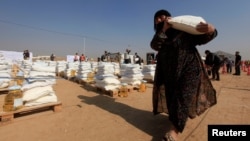About 33,000 people have now been displaced from their homes in and around Mosul since military operations began three weeks ago to oust Islamic State from Iraq's second-largest city.
Amid fierce urban combat the number of those who have fled is lower than initially expected but humanitarian officials are still preparing to care for up to 700,000 refugees, which is the expected "worst-case scenario" amid a "fast-developing situation," according to one senior U.S. administration official who was among those who spoke to reporters on Monday.
About half of those fleeing Mosul have made their way to shelters, an unusually high percentage, according to the official.
"We're not in a bad position right now in terms of getting resources that permitted us to pre-position materials that are actually needed," said another U.S. official who was also speaking on condition he not be further identified.
Food packages, known as MREs (Meals Ready-to-Eat), already are in place for 1.25 million people. Formal camps to accommodate 80,000 people will be ready by mid-December. About 900 water tankers, water systems for 50,000 households and 100 ambulances are standing by.
Team effort
The relief operation is led by the Iraqis, coordinated by the United Nations and relies on substantial financial assistance from the United States and other nations.
The U.S. contribution has totaled $1.1 billion since 2014, with about half of that delivered this year.
Despite preparations and learning from previous humanitarian operations there are tremendous uncertainties ahead due to "the unpredictable nature of war," said the first U.S. official.
"We have no idea what the unknown unknowns will be."
When to move the humanitarian operation into Mosul will depend on a proper security environment for which relief teams will rely on the U.N. and the Iraqi military for an assessment.
"It's very hard from Washington to say when those conditions will be met," the official said.
There also is concern about sectarian rivalries marring the fair distribution of aid.
Screening procedures have been distributed to Iraqi and Kurdish forces — who are ostensible allies — and there are pledges from the key players in the Iraqi government in Baghdad and the autonomous Kurdish region for the highest level of transparency and for international monitors to watch the screening process, U.S. officials said.
The ultimate goal is to ensure that as many people as possible can go back to Mosul once there is peace.
"Returning home is what this is all about," said a third U.S. official on a conference call Monday with reporters.
Return to Mosul
There are strong concerns, however, whether Kurdish forces will attempt to de-Arabize some neighborhoods in the ethnically diverse region.
Further complicating the current situation is an uninvited cross-border offensive launched by Turkey, seen as intended to limit Kurdish expansion in an area that was part of the Ottoman Empire.
During the siege by Islamic State, more than 100,000 Christians fled from the area where their community has been present since the dawn of Christianity.
A mass grave containing the remains of about 100 beheaded civilians has been discovered inside the School of Agriculture on the outskirts of Hammam al-Alil, a town south of Mosul that was recaptured from IS on Monday, said Iraq's Joint Military Command.
About 1 million people are still believed in Mosul, the last major stronghold in Iraq for the Islamic State extremists, which in 2014 took the city from the Iraqi army, imposing brutal Islamist rule.












